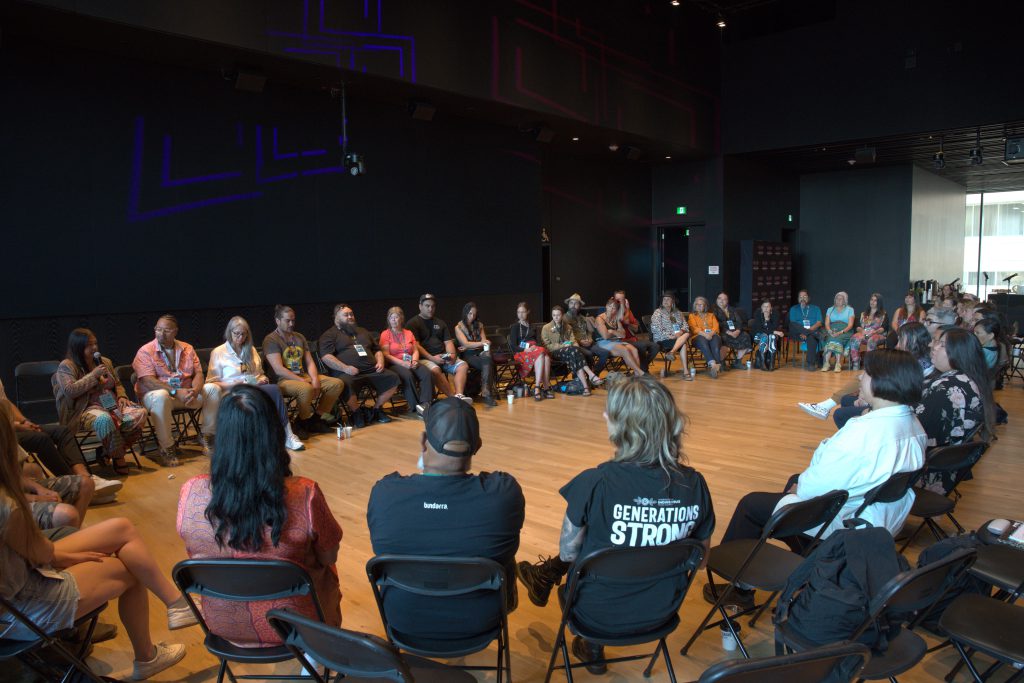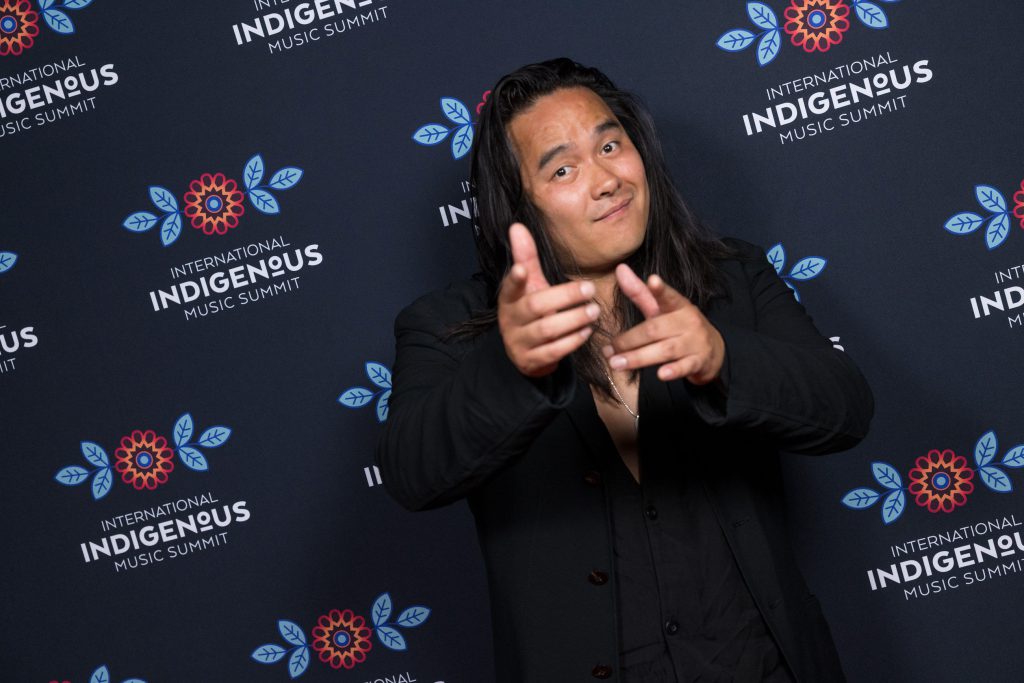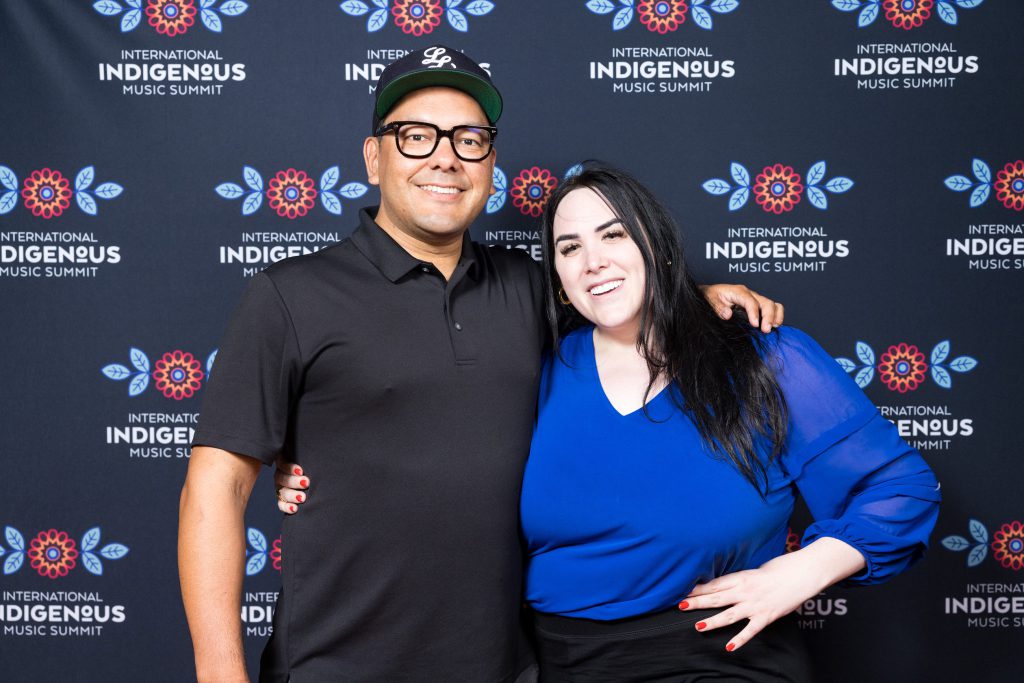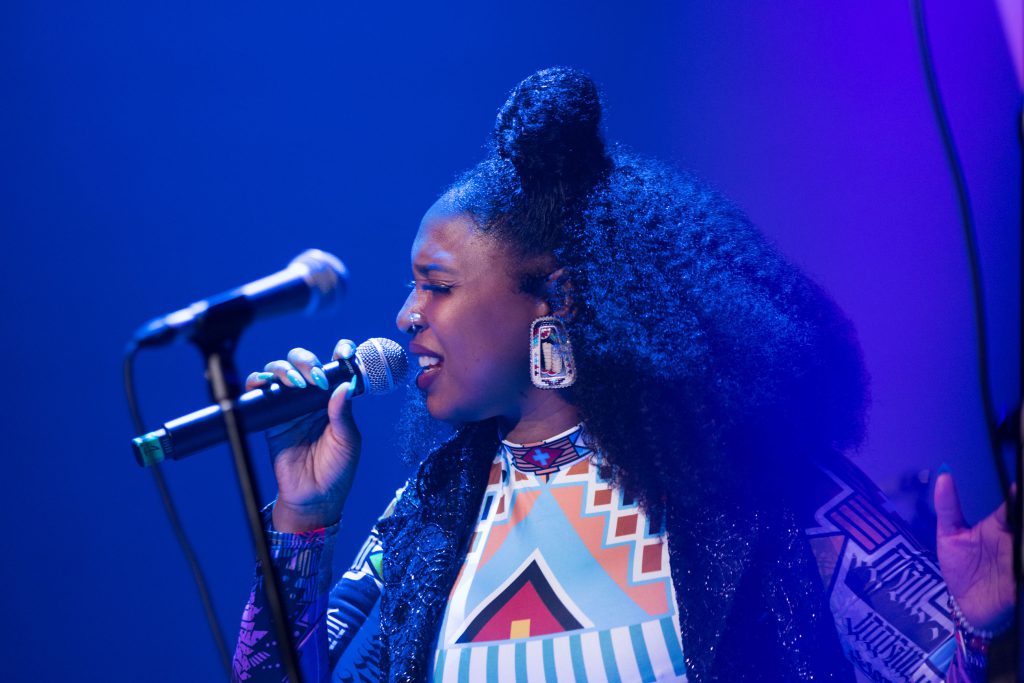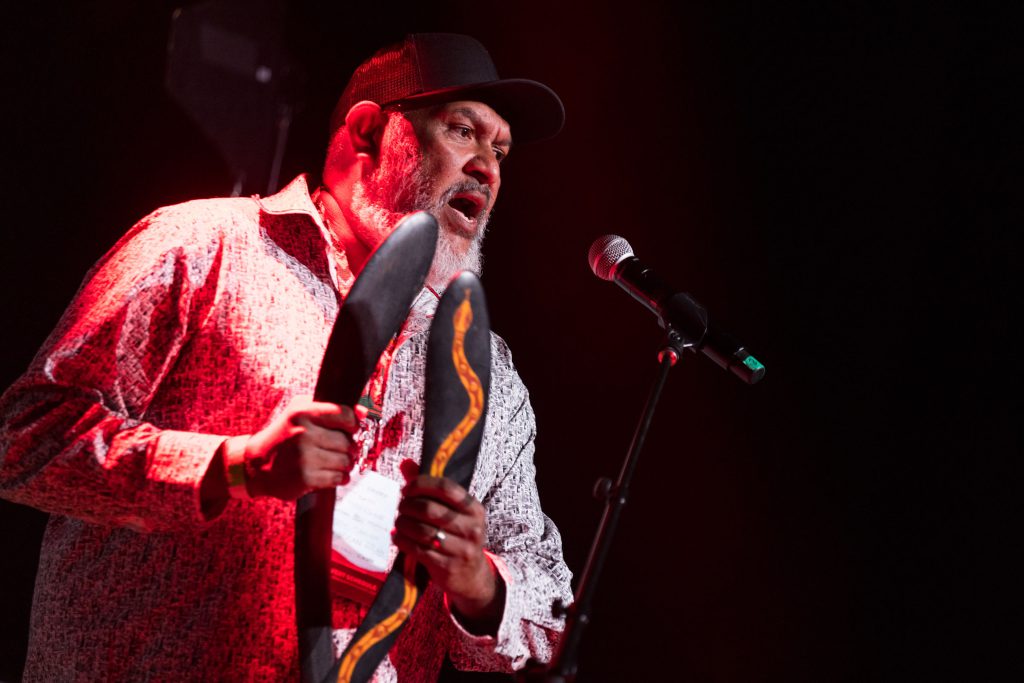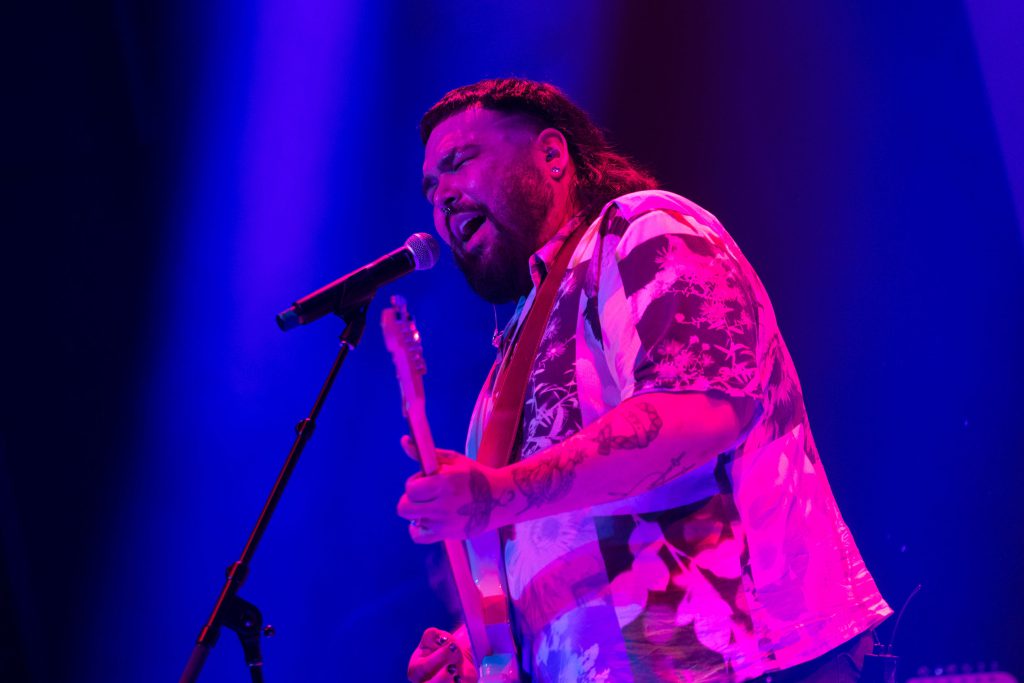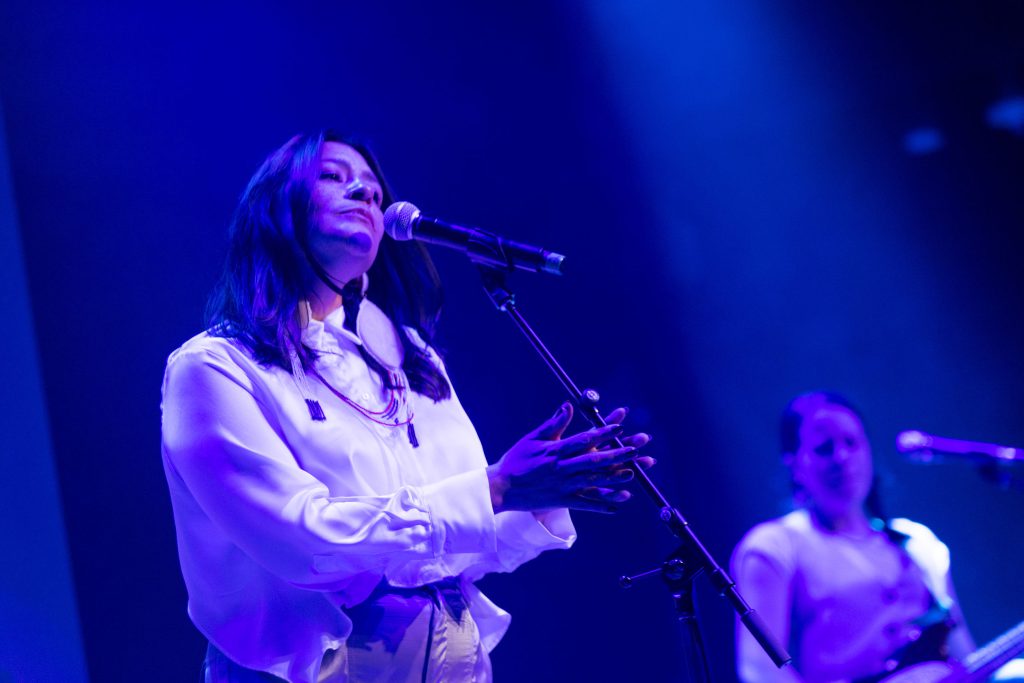Photo Gallery below
The International Indigenous Music Summit: Generations Strong provided potent musical showcases and highly educational conference sessions, as it unfolded from May 31 to June 4, 2023, mostly at the new TD Music Hall venue at Massey Hall in downtown Toronto.
The Opening Night Gala on Wednesday, May 31, at the TD Music Hall (the location of all events in this report, unless otherwise noted), kicked things off with a bang. Goombine, from the Yuin Nation in Australia, sang with a piercing voice, accompanied only by two sticks that he played for rhythm – sharing a few of the ancient songs passed down through his bloodline for thousands of years. Sebastian Gaskin led his soul/R&B trio in a set highlighted by his alternately sweet and powerful voice, and his incendiary electric guitar. Elisapie and her band previewed cover songs (sung in Inuktitut) from her next album, songs that created a “safe space” for her as she grew up – including Blondie’s “Heart of Glass” and Cyndi Lauper’s “Time After Time.” Maimouna Youssef (a.k.a. Mumu Fresh) and her band offered intense revelations from her life as a Mississippi Black Choctaw woman.
On Thursday, June 1, at the keynote discussion, Generations Strong, Alfredo Caxaj spoke about emigrating from Guatemala to Canada, and the Canadian narrative that ignores the ongoing oppression of its Indigenous peoples. Through a translator, Sara Curruchich said, “The impact of the colonial way lies heavy on our shoulders,” and added that music has the power to mobilize people, and that singing songs of resistance can be fundamental to survival and healing.
The same day, the summit held a workshop, Taking it to the Street: You made a beautiful record… now what? The first thing to do, said participant Roslayn Dennett, Executive Director of Folk Music Ontario, is to “breathe, take a minute, the planning is just getting started.” Dennett found agreement from Matt Maw, Director and Lead Artist Manager of Indigenous-owned and -operated label Red Music Rising. He said, “Ask yourself, what do you want to accomplish? What does success look like to you? And then work back from that. Jorge Requena Ramos, Executive Director of the West End Cultural Centre, in Winnipeg, said, “Know your audience and how they behave. Build your listener community first.” Andrés Mendoza, Vice President of CARAS, said, “It’s good to step back. Connect with people who you trust, whose ears you respect.” Tao-Ming Lau, Founder and Agent of the Blue Crane Booking Agency, emphasized the all-important hometown release party live performance: “How big will it be? What people do you want to have in the room? What venue will you play? What will the ticket price be?”
On Friday, June 2, the panel Art as an Act of Survival found moderator Ange Loft, best known as a member of the band Yamantaka Sonic Titan, hosting Susan Aglukark, Clayson Benally, and Elder Louise Lahache talked about “protecting our spirit in the music business,” and about how art is not only an act of survival, but also resistance and self-determination. Aglukark discussed how her beginnings as a singer-songwriter demanded vulnerability and courage, and that the ultimate purpose of her art was healing, not success. Clayson Benally, from Black Mesa, Arizona, said, “Art is life, art is identity.” Benally talked about how his family’s forced re-location, because of coal mining, led him to embrace music as a big part of his identity – initially via punk rock, “because of the anger and truth” in it. Lahache said that even as an elder, she was “in Grade 2” when it came to re-learning the language and culture that were taken from her as a young girl, because her family had to abandon it in order to protect her from being taken to a residential school (as her brother was). About the ceremonial songs that were banned by the government, she said, “we’re not going to let them stop is from singing anymore.”
Also on Friday, the workshop Forging Change – Mainstream Cultural Competencies, held at the Native Canadian Centre of Toronto, examined the systemic barriers, racism, and colonial structures that continue to prevent the Indigenous music community’s full participation in the mainstream music industry. Alan Greyeyes, Denise Bolduc, Cynthia Lickers-Sage, and Marek Tyler looked at some of the ways in which allies can become co-conspirators, and how this must translate into industry action with regard to protocols, contractual language, cultural riders, and beyond.
On Friday night the Official Showcases: TD Music Hall featured performances Lacey Hill, the Beatrice Deer Band, Curtis Clearsky and the Constellationz, Phyllis Sinclair, and host Shaneen Robinson; while Saturday’s showcase highlighted NIMKII and the NINIIS, Tia Wood, Sechile Sedare, and Miesha and the Spanks.
A panel on Sunday, June 4, Sustaining Climate Activism and Resilience, found Leela Gilday, Neil Morris (DRMNGNOW), Hinurewa te Hau, and Aaron Prosper discussing the ways in which Indigenous artists – who continue to raise awareness of the devastating impacts and rising threats of climate change – can support the growth of Indigenous arts spaces, and best undertake the work to chart a path forward, towards a more sustainable future.
Sunday’s Production & Songwriting workshop, held at the offices of presenting partner Universal Music Canada, found Raven Kanatakta, Hill Kourkoutis, Sebastien Gaskin, and Derek Hoffman offering practical guidance to the tools of the trade. Then participants aimed to assist their fellow Indigenous musicians in the arts of honing their craft, making connections, navigating fees and copyright, building tool kits, and finding support in community.
Sunday night’s finale was the Ishkode Records & Friends Closing Night Reception, hosted by longtime broadcaster Dave McLeod, and featuring standout performances from Ishkode co-founder Amanda Rheaume, Aysanabee, Digging Roots (centred on the duo of Raven Kanatakta and Ishkode co-founder ShoShona Kish), OMBIIGIZI, and Sebastian Gaskin.
The summit was sponsored in part by SOCAN and The SOCAN Foundation.
- At the summit/Au sommet. Photo : Skye Polson
- Aysanabee. Photo: Lindsay Duncan
- Left to right/De gauche à droite : Alan Greyeyes (Sakihiwe Festival), Charlie Wall-Andrews (SOCAN Foundation/Fondation SOCAN). Photo: Lindsay Duncan
- Maimouna Youssef. Photo: Lindsay Duncan
- Goombine. Photo: Lindsay Duncan
- Sebastian Gaskin. Photo: Lindsay Duncan
- Elisapie. Photo: Lindsay Duncan
